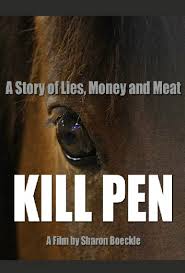I just came across a very interesting interview with the director of the documentary “Kill Pen” that I’d like to share with you here.
Kill Pen: an interview with the director of soon to be released documentary on Horse Slaughter
Sharon Boeckle is the director of Kill Pen, a soon to be released documentary that addresses the horse slaughter issue in the United States. Her work on this project was the inspiration for my own project, Horses: Sports, Culture and Slaughter.
 Please watch the trailer for Kill Pen.
Please watch the trailer for Kill Pen.
I asked Sharon a few questions about Kill Pen. Her answers are very revealing.
What inspired you to explore the subject matter in Kill Pen?
Three years ago I – like most of the public, I assume – had no clue that we ever slaughtered horses for human consumption in the United States. A chance visit to a wonderful horse rescue facility on Long Island in New York, Baiting Hollow Farm & Horse Rescue, opened my eyes to the reality of what often happens to horses in this country.
I’m not a “horse” person – have never owned one, never spent time around them – but I’m an animal lover and I have a strong sense of obligation to all species vulnerable to exploitation. So I started digging further, and there was a lot of information to uncover.
The story just kind of exploded – it was going to be a short documentary on Baiting Hollow but I realized quickly there was much more to expose. I followed the trail, the many trails, and realized that this issue is far more about politics and economics than it is about animal welfare, although the animal certainly pays a price for the forces pushing and pulling on this issue.
What key ideas have you learned, while working on the documentary, regarding horses?
I think the big takeaway for me has been an understanding that this is one singular animal in a very unusual and precarious position in our country; the horse has been a work animal, a sports animal, a companion or pet … but it’s never been a “meat” animal, at least not in our country to any wide extent.
That being said, it’s an animal that defies clear cut classification … to many, it’s a pet. To others, it is livestock. I think most of us in the country would agree that a dog is a pet; it’s not a work animal or livestock, not like a pig or cow. But engage in the same debate about the horse and you’ll find that the opinions vary significantly around the country. That gray area puts the horse in an unfavorable and unstable position when it comes to protection.
What is your plan for getting the documentary out there for people to see?
We have just begun the film festival submission process, and we’ve just released the trailer publicly so that it can be shared and promoted on social media. Once the film has screened publicly, we will explore other distribution channels as they open up to us.
What can people do, now, to support this work?
Share the Kill Pen trailer! Let people know the film is out there, it is complete, and we are looking for an opportunity to share it with the widest audience possible.
If we look at the difference made by such films as Blackfish, it’s clear that viewers have a lot of power in promoting films that spark the conversation to create major change. I think that could happen with Kill Pen. I KNOW it could happen, with the right champions behind it.
Your documentary inspired me to develop Horses: Sports, Culture, and Slaughter. We adopted different approaches, you tell a story, my series is purely informational. Can give the viewers an idea as to how you developed your “story”.
We anchor Kill Pen with the European horse meat scandal of 2013, where a number of very well-known companies were found to have “beef” products containing up to 40% horse meat. I think most people were not shocked that food labeling is deceptive, but they were very shocked to find out that it was HORSE meat (not pork, chicken, or lamb) being used as a cheap filler for beef.
So we open the film with that deceptive adulteration of products, and from there, explore the intricate web of politics and economics that brought many of our country’s racehorses, work horses, and – sadly – pets into those products. From there, an even bigger issue becomes the key argument of the film: with a nearly unregulated pipeline, there is no way to trace what dangerous toxins are in those racehorses, work horses, and pets before they end up in someone’s burger.
While we knew we wanted to address the often cruel and insensitive nature of horse slaughter itself, we decided to reduce the focus on that aspect of the issue for a few reasons; one, it tends to turn off sensitive viewers who might otherwise watch the film; two, on the opposite side, many people are not affected much by animal welfare or the realities of slaughter. For those folks, the suffering of the horses isn’t the strongest argument against horse slaughter; it was clear that a stronger argument could be made on food safety issues, and so we decided to steer the focus of the film in that direction.
Thank you Sharon, great work.
Please watch and share the trailer for Kill Pen.